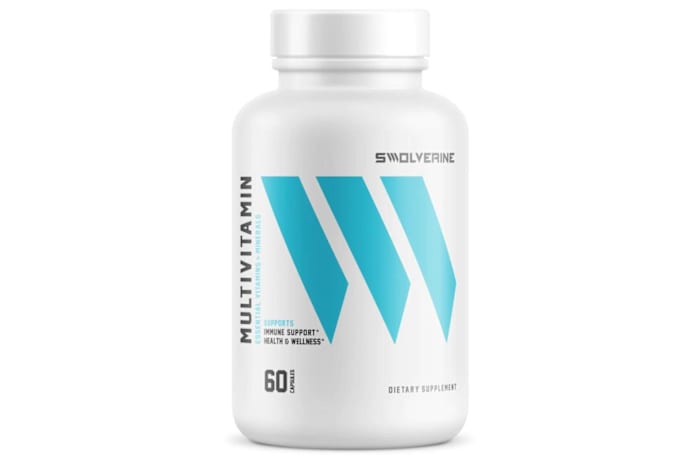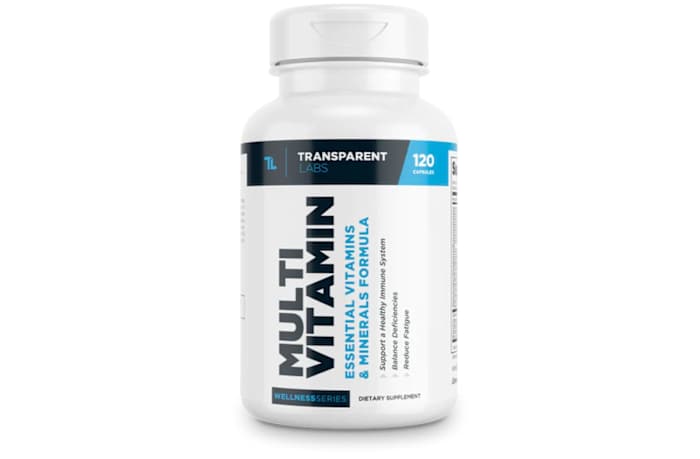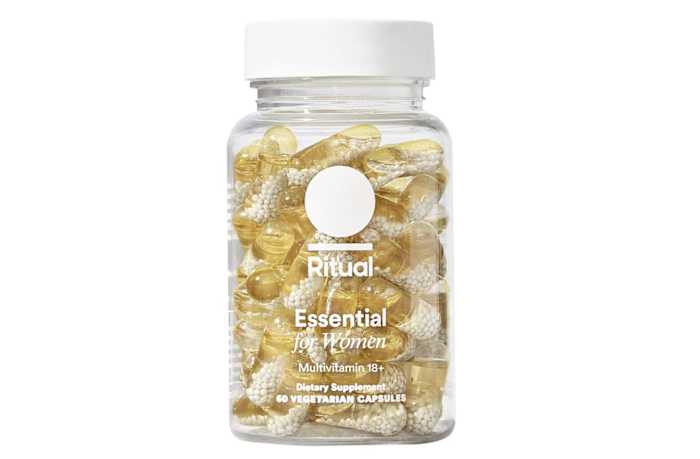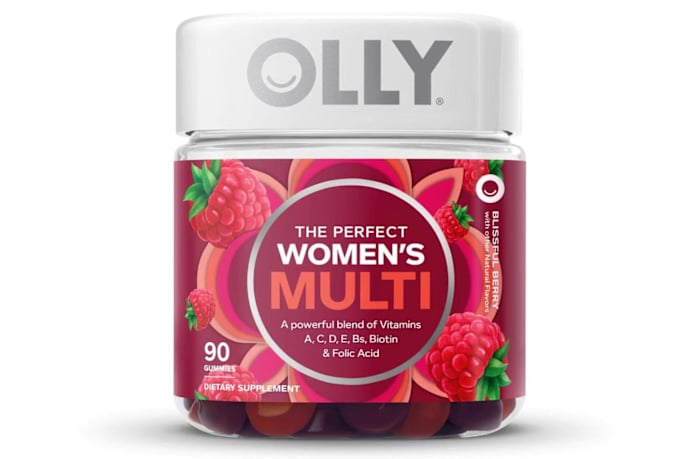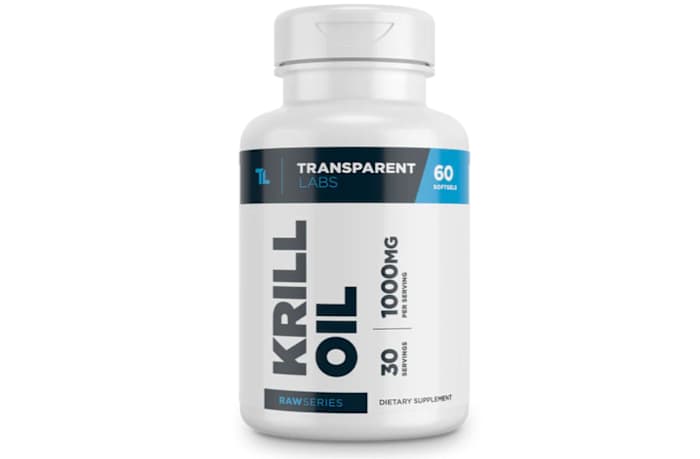The products featured in this article have been independently reviewed. When you buy something through the retail links on this page, we may earn commission at no cost to you, the reader. Sports Illustrated editorial staff are not involved in the creation of this content. Learn more here.
As women progress naturally through the different phases of life, changes occur in how our body systems are controlled. The Office on Women’s Health (OASH) states that women have unique nutritional requirements and need specific vitamins and minerals to support growth and development, reproductive health and prevent disease.
You may be asking yourself, “What vitamins should I take daily as a woman?” A well-balanced diet that includes fruits, vegetables, dairy, grains and a variety of proteins is a great way to ensure you’re getting all the essential nutrients. However, postmenopausal women, women who are pregnant or could become pregnant and those who follow restrictive diets may need additional vitamin and mineral supplements such as a multivitamin for women. Many vitamin brands also offer supplements for women over 50 and other specific groups.
In this article, we’ll go over nine essential vitamins for women and detail why they are important, what benefits they provide, how much you need and some foods and supplements they’re found in. That way, you can ensure your body gets the nutrients it needs.
Calcium
Why is calcium important?
Calcium is especially important for women because it helps build and protect strong bones. The OASH says that if you don’t get enough calcium from food, your body will take it from your bones, which weakens them.
Aside from building strong bones, calcium also supports brain health and function. The National Institute of Health (NIH) states, “Your body needs calcium for muscles to move and for nerves to carry messages between your brain and every part of your body. Calcium also helps blood vessels move blood throughout your body and helps release hormones that affect many functions in your body.”
Benefits of calcium for women
Strong bones can reduce the risk of osteoporosis, which is more common in women. One study found that osteoporosis prevalence increased from 2007-2018 for women and not men. This study also concluded that 43.1 percent of adults ages 50 and older had low bone mass, a precursor of osteoporosis, and 51.5 percent of those adults were women.
Who needs calcium?
All women need calcium. The following groups of women need to take extra care to ensure they are getting this nutrient:
- Women who are pregnant or breastfeeding: The American Pregnancy Association (APA) states that these women need adequate amounts to support the circulatory, musculoskeletal and nervous systems. It also notes that this group is at a greater risk of developing osteoporosis later in life if they do not consume enough
- Postmenopausal women: Estrogen helps protect from bone loss. Since menopause slows estrogen production, these women are more at risk for bone loss. That means taking steps to ensure you’re getting enough calcium is of utmost importance
- Those who are lactose intolerant: Since dairy is a common source of calcium this group has to get their intake from other sources
- Vegans and vegetarians: Those who follow this diet and avoid foods like meat, fish, eggs and dairy may not be getting enough calcium
- Adolescent girls (ages nine to 18): The OASH recommends an increased intake of 1,300 milligrams daily due to bones developing for adulthood
How much should you take?
The NIH recommends the following amounts of calcium for women per day:
- Teens 14 to 18 years: 1,300 milligrams
- Adults 19 to 50 years: 1,000 milligrams
- Postmenopausal women 50+ years: 1,200 milligrams
- Pregnant and breastfeeding teens: 1,300 milligrams
- Pregnant and breastfeeding women: 1,000 milligrams
Foods that calcium is found in
Here are foods that you can integrate into your diet to get the recommended daily amount (RDA) of calcium:
- Dairy milk and plant-based milk
- Cheese
- Yogurt
- Edamame
- Tofu made with calcium sulfate
- Salmon (with bones)
- Leafy greens (kale, bok choy, spinach, collard greens)
- Almonds
Just because you follow a restricted diet doesn’t mean you can’t get the RDA, you just have to be more intentional with your food choices. For example, choose fortified soy milk as your milk alternative since it has 367.5 milligrams of calcium per cup serving, as opposed to coconut milk, which has 38.4 milligrams per cup.
Our favorite calcium supplement
Swolverine Multivitamin
Swolverine Multivitamin is a veggie capsule with 162 micrograms of calcium, which can help you reach the RDA. It also contains 10 micrograms of vitamin D, a nutrient your body needs to absorb calcium. This supplement is gluten-free, and it is third-party tested to ensure quality, content and purity.
Vitamin B12
Why is vitamin B12 important?
Vitamin B12 is one of the best vitamins for women to take because it helps make DNA, keeps your blood and nerve cells healthy and supports the brain. The Harvard T.H. Chan School of Public Health (HSPH) says vitamin B12 deficiency can lead to serious blood conditions like anemia, fatigue, weakness, nerve damage, memory loss, confusion, dementia, depression and seizures. Vitamin B12 is not made naturally in the body, so women need to get the RDA through foods or supplements.
Benefits of vitamin B12 for women
Vitamin B12 helps produce red blood cells that deliver oxygen throughout the body to give women energy and help their bodies function healthily. One study found that levels of B12 slowed cognitive decline in its participants. The APA states that if pregnant women combine vitamin B12 and folic acid, it can help prevent spina bifida and other spinal and central nervous birth defects. Vitamin B12 can also benefit active women, and a 2016 study concluded that this vitamin promotes muscle recovery when consumed daily.
Who needs vitamin B12?
HSPH notes that the following groups have an increased risk of developing a vitamin B12 deficiency:
- Women 50 years or older: At this age, the stomach cells don’t create hydrochloric acid as efficiently. This can be problematic because vitamin B12 is absorbed when hydrochloric acid in the stomach separates B12 from the protein it is attached to.
- Women with gastrointestinal disorders: These can lead to the body secreting too little hydrochloric acid. Women in this group include those who have celiac disease, Crohn’s disease or those who have undergone weight loss surgery.
- Women who take certain prescription medications: There’s a handful of common prescription medications that reduce B12 absorption. Always consult your doctor about the side effects of taking medication long-term and take action to avoid deficiencies whenever possible.
- Women with strict vegan diets: If you’re avoiding animal products, it’s a good idea to consider sourcing vitamin B12 from fortified foods, supplements or nutritional yeast. A B12 deficiency can lead to neurological damage in the womb, so pregnant and breastfeeding women should consult with their doctor about taking B12 supplements.
How much should you take?
The NIH Office of Dietary Supplements lists the RDA of vitamin B12 for women as follows:
- Teens 14-18 years: 2.4 micrograms
- Adults 19+ years: 2.4 micrograms
- Pregnant teens and women: 2.6 micrograms
- Breastfeeding teens and women: 2.8 micrograms
One study found that adults 50 and older may benefit from 500 micrograms per day of B12 in crystalline form, which does not require hydrochloric acid for digestion. Always consult with your primary care physician about how much B12 you need.
Foods that vitamin B12 is found in
Here are foods that can help you reach the RDA:
- Tuna
- Salmon
- Lean cuts of beef
- Liver and kidneys
- Clams
- Soy products labeled “fortified B12”
- Yogurt, cottage cheese, milk and other dairy products
- Eggs
- Fortified cereals
- Nutritional yeast
Our favorite vitamin B12 supplement
Transparent Labs Multivitamin
The Transparent Labs Multivitamin has 200 micrograms of B12 per serving, which exceeds the RDA for all groups. This supplement contains no artificial sweeteners, colors or preservatives. It’s vegetarian-friendly, and Transparent Labs utilizes an allergen control program to minimize cross-contamination.
Check out our Transparent Labs Multivitamin review for more information!
Vitamin C
Why is vitamin C important?
Vitamin C is naturally present in some foods and is required for the biosynthesis of collagen, L-carnitine and some neurotransmitters. It also plays a role in regenerating antioxidants and improves the absorption of nonheme iron, which is the form of iron found in plant-based foods. Vitamin C also has an effect on our immune system.
Benefits of vitamin C for women
Vitamin C contributes to the production of collagen, which serves as the building block for skin, bones, tendons, ligaments and tissues including those in the reproductive system. The APA says that expecting women need vitamin C to protect tissues from damage, help the body absorb iron and build a healthy immune system. One study also notes that getting the RDA of vitamin C supplementation produces antidepressant effects and improves mood.
Vitamin C can also support the absorption of iron, which is important for menstruating women who have a higher demand for this nutrient.
Who needs vitamin C?
Vitamin C is an essential nutrient for everyone; however, the following groups as more at risk for deficiency:
- Smokers or those exposed to secondhand smoke: The NIH says that smokers or those exposed to secondhand smoke need 35 milligrams more of vitamin C per day than nonsmokers
- Women who are pregnant or lactating: These life stages require a higher amount of micronutrients to meet the demands of increased energy needs
- Those who have ulcerative colitis, Crohn’s disease or celiac disease: Individuals with these conditions may have trouble absorbing nutrients due to difficulties with digestion
- Post-menopausal women: After menopause, there is a significant reduction in collagen production. Vitamin C supplementation is needed to support collagen production
How much should you take?
The NIH lists the RDA of vitamin C for women as:
- Teens 14-18 years: 65 milligrams
- Adults 19+ years: 75 milligrams
- Pregnant teens: 80 milligrams
- Pregnant adults: 85 milligrams
- Breastfeeding teens: 115 milligrams
- Breastfeeding adults: 120 milligrams
Foods that vitamin C is found in
Vitamin C is mainly found in fruits and vegetables, specifically citrus fruits, tomatoes and potatoes. Here are some other food sources:
- Red pepper
- Oranges
- Grapefruit
- Kiwi
- Broccoli
- Strawberries
- Cantaloupe
- Cabbage
- Cauliflower
- Spinach
Our favorite vitamin C supplement
Swolverine Vitamin C Gummies
The Swolverine Vitamin C Gummies contain 250 milligrams of vitamin C which is 278 percent of the RDA. These gummies are a standalone vitamin C supplement that works well for those trying to supplement vitamin C without additional nutrients. These are orange flavored and are vegan, non-GMO and gluten-free.
To learn more about our top picks for vitamin C supplements, check out The Best Vitamin C Supplements of 2024.
Folate (Folic Acid)
Why is folate important?
Folate is the natural form of the B9 vitamin and folic acid is the synthetic form of folate used in supplements and fortified foods. Each provides similar benefits, namely supporting the production of new cells for our hair, skin, nails and more. This vitamin also helps break down homocysteine, an amino acid that can cause adverse effects in higher amounts.
Benefits of folate for women
Folate helps keep the blood healthy by supporting the formation and growth of red blood cells. It can also prevent folate-deficiency anemia, which the OASH states is more common in women of childbearing age than men. Pregnant women and women who are planning to get pregnant need the RDA to prevent birth defects.
Who needs folate?
Folate is an essential B vitamin that everyone needs to be healthy. The CDC urges women of reproductive age to take folate because it helps protect against birth defects in the baby’s brain and spine. Folate metabolizes in the body quickly, so even if you are not planning on getting pregnant, you still need to consume the RDA so your body functions properly.
How much should you take?
The average daily amounts for women recommended by the NIH are as follows:
- Teens 14-18 years: 400 micrograms
- Adults 19+ years: 400 micrograms
- Pregnant teens and women: 600 micrograms
- Breastfeeding teens and women: 500 micrograms
Foods that folate is found in
The following foods naturally contain folate:
- Beans
- Peanuts
- Dark leafy greens (broccoli, spinach, romaine lettuce, Brussels sprouts, turnip greens)
- Oranges
- Nuts
- Poultry and meat
- Eggs
- Whole grains
The HSPH states that foods with folic acid are better absorbed in the body. Here are several foods that contain folic acid:
- Enriched bread and pasta
- Cornmeal
- White rice
- Breakfast cereals
- Flours
Our favorite folate supplement
Ritual Essential Multivitamin for Women
The Ritual Essential Multivitamin for Women has more than the RDA for all age groups. It contains 1,000 micrograms of the active form of folic acid sourced from salt, phenylethylamine and glucosamine salt. Ritual states that this type of folic acid bypasses the common gene variations that make converting folic acid to folate difficult for up to one third of people. This supplement contains nine traceable ingredients and is free of major allergens.
Vitamin E
Why is vitamin E important?
Vitamin E seeks out free radicals that can damage cells and helps protect our bodies from the damaging effects by giving them an electron to stabilize them to prevent further damage. This process plays an essential role in staying healthy since free radical damage has been associated with early stages of artery clogging, cancer, vision loss and other chronic conditions.
Benefits of vitamin E for women
Vitamin E may play a role in women’s reproductive health. Studies have shown that consuming the RDA can improve the rate of female fertility and reproductive health. One study notes that it supports a process that plays a significant role in relieving painful menstruation. It is also considered an anti-inflammatory agent for the skin, and several studies support that it prevents damage after UV exposure.
Who needs vitamin E?
Everyone needs vitamin E. While the NIH states that deficiency in healthy people is very rare, those who have conditions where fat is not properly digested or absorbed are more at risk. Lactating women need a slightly higher RDA to compensate for the amount secreted into breast milk.
How much should you take?
The NIH recommends the following amounts for women:
- Ages 14+: 15 milligrams
- Pregnant teens and women: 15 milligrams
- Breastfeeding teens and women: 19 milligrams
Foods that vitamin E is found in
Vitamin E is found in the following foods:
- Sunflower seeds
- Beets, collard greens, spinach
- Pumpkin
- Red bell pepper
- Mango
- Avocado
- Asparagus
- Almonds, peanuts
- Plant-based oils (sunflower, safflower and soybean oil)
Our favorite vitamin E supplement
OLLY The Perfect Women's Multi
The Perfect Women's Multi by OLLY is an excellent option if you’re looking for a supplement that contains 100 percent of the RDA of vitamin E. These berry-flavored gummies have 17 other vitamins and minerals that support women’s health and don’t contain any artificial colors or flavors.
Omega-3
Why is omega-3 important?
Omega-3 is an essential fat that your body does not produce naturally. It affects the function of cell receptors and helps produce hormones that regulate blood clotting, inflammation and the retraction and contraction of artery walls. Omega-3 also connects receptors to cells that regulate genetic function. The HSPH states, “These fats appear to help the heart beat at a steady clip and not veer into a dangerous or potentially fatal erratic rhythm.”
Benefits of omega-3 for women
Omega-3 can benefit women who are at risk for heart disease by lowering blood pressure and triglycerides. It can also affect the risk of preterm birth and plays a critical role in the brain development of an unborn baby. Brain cells with a high amount of omega-3 have shown more efficient communication with other cells and have anti-inflammatory actions that may help relieve depression symptoms. NASA studies have found evidence that omega-3 plays a role in mitigating bone loss that occurs in osteoporosis.
Who needs omega-3?
Omega-3 is an essential nutrient that everyone needs; however, the following groups of women may be at risk for deficiency:
- Women who are pregnant or breastfeeding: The FDA recommends these women eat between eight and 12 ounces of fish per week. Since this does not provide much omega-3, the APA advises these women to take purified fish oil supplements from a reputable source
- Women who are 50 or older: This group is at a greater risk of developing osteoporosis. Studies have shown consuming omega-3 may help reduce bone loss.
- Vegans and vegetarians: Women who follow a vegetarian or vegan lifestyle do not consume fish, so this group may be at risk for developing a deficiency
How much should you take?
The Food and Nutrition Board of the Institute of Medicine (FNBIOM) states that there is not enough data to establish an estimated average requirement (EAR) of omega-3. Therefore, they set an adequate intake (AI) amount based on the omega-3 intakes of healthy populations. The NIH lists the AIs for women as follows:
- Teens 14-18 years: 1.1 grams
- Adults 19+ years: 1.1 grams
- Pregnant teens and women: 1.4 grams
- Breastfeeding teens and women: 1.3 grams
Foods that omega-3 is found in
You can consume omega-3 from the following foods:
- Fish (salmon, herring, mackerel, trout)
- Plant oils (flaxseed, soybean, canola oil
- Chia seeds
- Walnuts
- Shrimp
- Edamame
- Sea bass
Our favorite omega-3 supplement
Transparent Labs Krill Oil
The Transparent Labs Krill Oil provides 220 milligrams of omega-3 fatty acids and 1,000 milligrams of krill oil which exceeds the AI indicated by the NIH. The soft gel capsules are made using an Antarctic krill species rich in omega-3 fatty acids. This supplement also has 400 milligrams of phospholipids, which one study says helps krill oil absorption.
Related post: The Best Fish Oil and Omega-3 Supplements for Your Brain, Heart and More
Vitamin D
Why is vitamin D important?
Vitamin D is a fat-soluble vitamin that helps the body absorb phosphorus and calcium, which are critical vitamins for bone health. HSPH states, “Laboratory studies show that vitamin D can reduce cancer cell growth, help control infections and reduce inflammation.” It also regulates other cellular functions and has neuroprotective properties that support immune function, muscle health and brain cell activity.
Benefits of vitamin D for women
Vitamin D maintains the balance of calcium in your blood and bones. Since calcium can’t be absorbed without Vitamin D, these vitamins go hand in hand in the fight against bone loss, which is more prevalent in post-menopausal women. Vitamin D may also play a role in a woman’s reproductive system. The University of Southern California Fertility Clinic states that the active form of vitamin D, calcitriol, helps organize immune cells in the uterus to protect the pregnancy from infections. One study found that vitamin D supplementation may also significantly improve the chances of a successful IVF cycle.
Individuals with vitamin D deficiencies have also seen a significant improvement in well-being when assessed using depression screening tools after taking vitamin D supplements.
Who needs vitamin D?
Women of all ages need vitamin D. The following groups of women should take special care to ensure that they get the RDA:
- Women with inflammatory bowel disease or celiac disease: Due to difficulties with absorbing nutrients, women in this group may need additional supplementation.
- Postmenopausal women: After menopause, the body produces less estrogen, which can lead to bone loss and osteoporosis.
- Women who live in areas with limited sun exposure: Women who live in areas that get a limited amount of sunlight or those who wear clothing that covers most of the body are at risk for vitamin D deficiency.
How much should you take?
The NIH lists the RDA of vitamin D for women as:
- Teens 14-18 years: 15 micrograms
- Adults 19-70 years: 15 micrograms
- Adults 70+ years: 20 micrograms
- Pregnant teens and women: 15 micrograms
- Breastfeeding teens and women: 15 micrograms
Foods that vitamin D is found in
Vitamin D is not found in many foods and can be absorbed from the sun or consumed using supplements. Here are some foods that contain vitamin D:
- Salmon
- Swordfish
- Tuna
- Sardines
- Beef liver
- Egg yolk
- The flesh of fatty fish
- Fish liver oils
- Foods fortified with vitamin D (cereals, orange juice, dairy and plant-based milk)
Our favorite vitamin D supplement
Ritual Essential Multivitamin for Women
The Ritual Essential Multivitamin for Women contains 50 micrograms of vegan-certified vitamin D and is formulated specifically for women. Ritual conducted a 12-week clinical trial where the brand partnered with doctors from Auburn University to conduct a double-blind placebo-controlled study. The results showed an increase in vitamin D levels by 43 percent in the women who took the Essential Multivitamin.
Related Post: The Best Vitamin D Supplements of 2024, According to a Nurse
Potassium
Why is potassium important?
Potassium helps our body maintain normal fluid levels inside our cells, and it offsets the damaging effects of sodium in our blood vessels by relaxing them and excreting sodium. It is also required for muscle contraction, communication between muscles and nerves and overall muscle function.
Benefits of potassium for women
If there is a high amount of acid in your blood, your body may start to break down your bones to counteract it. Potassium-rich foods produce alkali in the body, which works to neutralize this acid so your bones don't have to. This nutrient is especially important for women because they are more at risk for osteoporosis and bone loss.
Who needs potassium?
All women need potassium, especially those who are 50 years or older, since this group can benefit from the positive effects of potassium on bone health. Morning sickness associated with pregnancy can cause potassium loss. One study found that a small increase is needed for women who are breastfeeding as well.
How much should you take?
The FNB found the data for the estimated daily requirement insufficient and established the following AI amounts for women:
- Teens 14-18 years: 2,300 milligrams
- Adults 19-50 years: 2,600 milligrams
- Adults 51+ years: 2,600 milligrams
- Pregnant teens: 2,600 milligrams
- Pregnant adults: 2,900 milligrams
- Breastfeeding teens: 2,500 milligrams
- Breastfeeding adults: 2,800 milligrams
Foods that potassium is found in
Here are a few potassium-rich foods:
- Bananas
- Coconut water
- Avocado
- Spinach, beet greens
- Tomato
- Dairy and plant-based milk
- Yogurt
- Beans, lentils
- Dried fruits (apricots, raisins)
- Oranges
- Chicken
- Salmon
Our favorite potassium supplement
Transparent Labs Multivitamin
The Transparent Labs Multivitamin has 150 milligrams of potassium and other key vitamins and minerals to support active women. There is also a minimal amount of additional ingredients, and these capsules do not contain artificial sweeteners, coloring or preservatives.
Related Post: The Best Potassium Supplements of 2024 for Cramping, Fatigue and More
Vitamin A
Why is vitamin A important?
Vitamin A maintains and regulates cell growth and division, helps remodel bone and supports the production of white blood cells. It also plays an important role in your vision and reproductive health, and it helps your organs function.
Benefits of vitamin A for women
Vitamin A helps grow and maintain tissues in the gastrointestinal tract, bladder, lungs, urinary tract, vagina, cornea and skin. It’s also beneficial for expecting women because it supports the growth and development of the baby in the womb.
Who needs vitamin A?
The benefits of vitamin A are relevant to all women. Women who are pregnant need vitamin A to help bones and teeth grow. The APA also mentions, “Vitamin A is involved in the regulation of gene expression, growth and development, cellular production, vision and immunity.” Vitamin A is also essential for the eyes, ears, limbs and heart development in the womb.
How much should you take?
The NIH recommends the following amounts of vitamin A for women:
- Teens 14-18 years: 700 micrograms
- Adults 19+ years: 700 micrograms
- Pregnant teens: 750 micrograms
- Pregnant adults: 770 micrograms
- Breastfeeding teens: 1,200 micrograms
- Breastfeeding women: 1,300 micrograms
Foods that vitamin A is found in
Vitamin A is found naturally in:
- Beef liver and other organ meats
- Leafy greens (spinach, kale, turnip greens)
- Orange and yellow vegetables (sweet potatoes, bell peppers, carrots, winter squash)
- Broccoli
- Dairy products such as milk and cheese
- Eggs
- Fortified breakfast cereals
Our favorite vitamin A supplement
Olly The Perfect Women's Multi
The Perfect Women's Multi by OLLY comes in a convenient gummy form and has 450 micrograms of vitamin A. The colors, sweeteners and flavors come from natural sources and it’s berry-flavored. This supplement also contains vitamins essential for women, such as folic acid and calcium, and it’s gluten-free.
For more information, check out our OLLY Women’s Multivitamin Review.
Prices are accurate and items in stock as of publish time.

